US Policy Towards Syria and Iran
Congresswoman Jane Harman, Director, President and CEO of the
Woodrow Wilson International Center for Scholars
David Sanger, The New York Times
Photos | Transcript
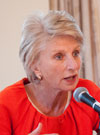 Washington, DC—On May 14, 2012, WFPG hosted a Beyond the Headlines series event with Congresswoman Jane Harman, Director, President, and CEO of the Woodrow Wilson International Center for Scholars. David Sanger, New York Times Chief Washington Correspondent, moderated the discussion on US Policy towards Syria and Iran, which focused on how to prevent Iran's development of nuclear weapons and strategies for avoiding further violence and bloodshed in Syria. Her remarks also covered other key national security issues, such as US policy toward China and missile testing in North Korea and India.
Washington, DC—On May 14, 2012, WFPG hosted a Beyond the Headlines series event with Congresswoman Jane Harman, Director, President, and CEO of the Woodrow Wilson International Center for Scholars. David Sanger, New York Times Chief Washington Correspondent, moderated the discussion on US Policy towards Syria and Iran, which focused on how to prevent Iran's development of nuclear weapons and strategies for avoiding further violence and bloodshed in Syria. Her remarks also covered other key national security issues, such as US policy toward China and missile testing in North Korea and India.
On Iran, Harman said she believes US strategy is working in preventing the country's acquisition of nuclear weapons. In her view, President Obama has been very clear that he will do everything in his power to keep Iran from having nuclear capability. There is both domestic and international support for sanctions on Iran, she said. Although some of the most significant sanctions have not yet begun to hurt the Iranian economy, these sanctions are likely to have considerable impact this summer. Harman suggested that such sanctions might lead to changes in Iranian policy in the future.
Harman also discussed third party enrichment proposals, in which Iran's uranium reserves would be exported and enriched to civil nuclear grade by a third party before being returned to Iran for use in power generation. She brought up the notion of an IAEA-supported international fuel bank that makes civil-grade nuclear energy for use anywhere, including in the US. While this situation is unlikely, Harman hopes economic sanctions will force Iran to ship its enriched uranium elsewhere through some other method. Additionally, she warned that the US must focus on policy change rather than regime change in Iran. She strongly believes that a military option against Iran—which Israel supports—is unappealing and that we should "give success a chance."
The Congresswoman was less optimistic about the situation in Syria, saying the UN plan for a ceasefire is hopeless and risks giving the Syrian government time to re-arm. Disarming the government forces without enormous bloodshed is very difficult. Arming the opposition, a very diverse mix which may include some al Qaeda sympathizers and groups in favor of ethnic cleansing, poses problems as well. Instead, Harman prefers a "Yemen-like solution in Syria," in which the Bashar family would relocate to safety in Russia and a new, more stable government would take its place.
Harman commended the way both the US and China negotiated the emigration of Chen Guangcheng from China. She specifically commented on the face-to-face interaction involved, citing this as a useful tool in successfully forming compromises. Harman was less pleased with the leadership in North Korea, relaying her belief that Kim Jong-un is using nuclear testing and dealing with his country's enemies as a method of avoiding pressure to fix the economy. She also condemned India's missile test that followed North Korea's. She believes it sent a message to North Korea and Iran that creating individualized definitions of the NPT is acceptable and called it "a misguided action and destabilizing in an unstable world."
In Harman's opinion, the US needs strategic guidelines for dealing with conflicts, whether they are large uprisings like those in Syria and Libya, or other types of popular demonstrations like those in Russia and China. Of this, she said, "In the end, we can't bomb our way to a win, or fight our way—we have to win the argument. And the way we win the argument is to be very clear about where we will use the US military and assist international military organizations in intervening and where we won't."
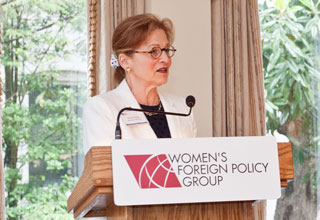 |
 |
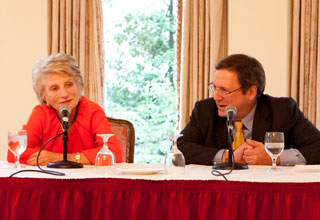 |
WFPG Board Chair Maxine Isaacs welcomes guests
|
|
Congresswoman Jane Harman and New York Times Chief Washington Correspondent David Sanger
|
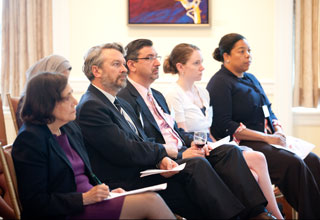 |
 |
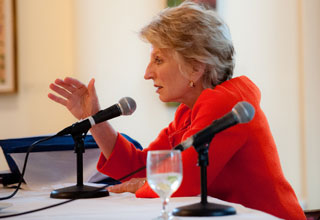 |
WFPG President Patricia Ellis, Ambassador Joško Paro of Croatia, and guests listen to the program
|
|
Jane Harman addresses WFPG
|
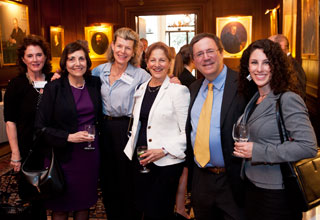 |
 |
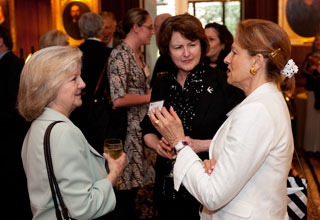 |
Patricia Ellis with David Sanger and WFPG
Board Members Donna Constantinople, Diana
Negroponte, and Maxine Isaacs
|
|
Maxine Isaacs and Board Member Theresa Loar
speak at the reception
|
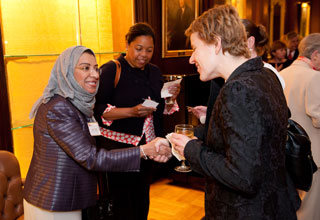 |
 |
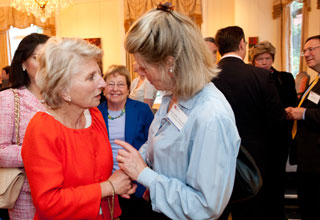 |
Diplomats from Oman and Switzerland greet
each other during the reception
|
|
Jane Harman and Diana Negroponte
speak after the program
|
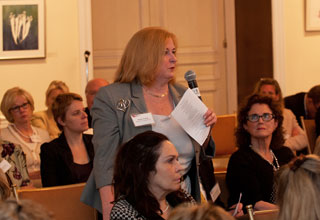 |
 |
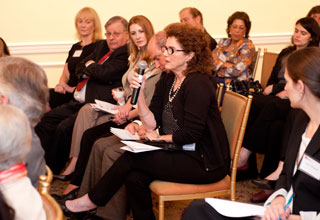 |
| |
|
|
|
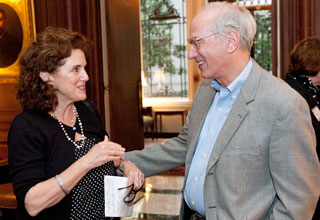 |
 |
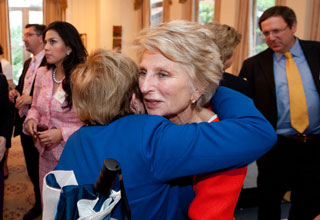 |
| |
|
|
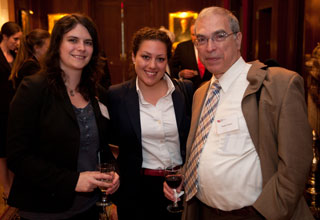 |
 |
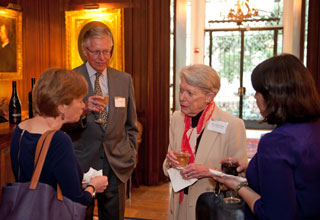 |
| |
|
|